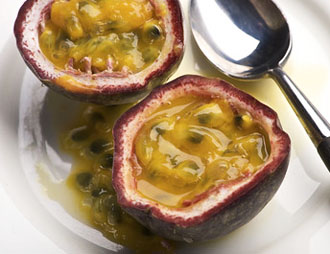The Benefits of Passion Fruit: A Delicious and Nutritious Addition to Your Diet
Passion fruits are not only delicious but also packed with nutrients that can benefit your health in various ways. From their unique tart flavor to their rich nutritional profile, there are plenty of reasons to include passion fruit in your diet. In this article, we will explore the selection, storage, preparation, and serving methods of passion fruit, as well as its health benefits.
Selection and Storage
Passion fruits can be found year-round in supermarkets in the United States, while their availability varies seasonally in other parts of the world. When choosing passion fruits, opt for ones that are well-ripe, plump, and heavy for their size. Wrinkled surfaces indicate a more flavorful and sugar-rich fruit. Minor cuts and spots on the skin are common and do not impact the fruit’s quality.
Once at home, store passion fruits in a cool, dark place for 1-2 days. Ripe fruits can be refrigerated for up to one week. Alternatively, freeze the pulp by scooping it into a bowl, adding a little sugar, and freezing it in a chiller tray.
Preparation and Serving Methods
To prepare passion fruit, wash it in cold water, dry it, and cut it lengthwise into two halves. Scoop out the juicy pulp with a spoon and discard the tough shell. Passion fruits have a unique tart and sweet flavor, with purple varieties typically being more flavorful than yellow-golden ones.
There are various ways to enjoy passion fruit, including eating the pulp fresh, incorporating it into fruit salads, using it in sauces and jellies, and adding it to recipes like passion fruit mousse, ice cream, and desserts.
Health Benefits of Passion Fruit
Passion fruit is not only a tasty addition to your diet but also a nutritious one. It is a good source of vitamins A and C, as well as dietary fiber. The antioxidants found in passion fruit can help reduce inflammation and protect against chronic diseases. Additionally, passion fruit is low in calories and can be a healthy snack option.
Frequently Asked Questions (FAQ)
Q: Can I eat the seeds of a passion fruit?
A: Yes, the seeds of a passion fruit are edible and add a crunchy texture to dishes.
Q: How can I tell if a passion fruit is ripe?
A: Ripe passion fruits will be plump, heavy for their size, and have wrinkled surfaces.
Q: Can I freeze passion fruit pulp?
A: Yes, passion fruit pulp freezes well. Simply scoop it into a bowl, add sugar, and freeze it in a chiller tray.
Conclusion
Passion fruit is not only a delicious tropical fruit but also a nutritious addition to your diet. With its unique flavor, versatility in recipes, and health benefits, there are plenty of reasons to enjoy passion fruit regularly. Whether you eat it fresh, use it in cooking, or freeze it for later, passion fruit is a tasty and beneficial fruit that can enhance your overall well-being.
